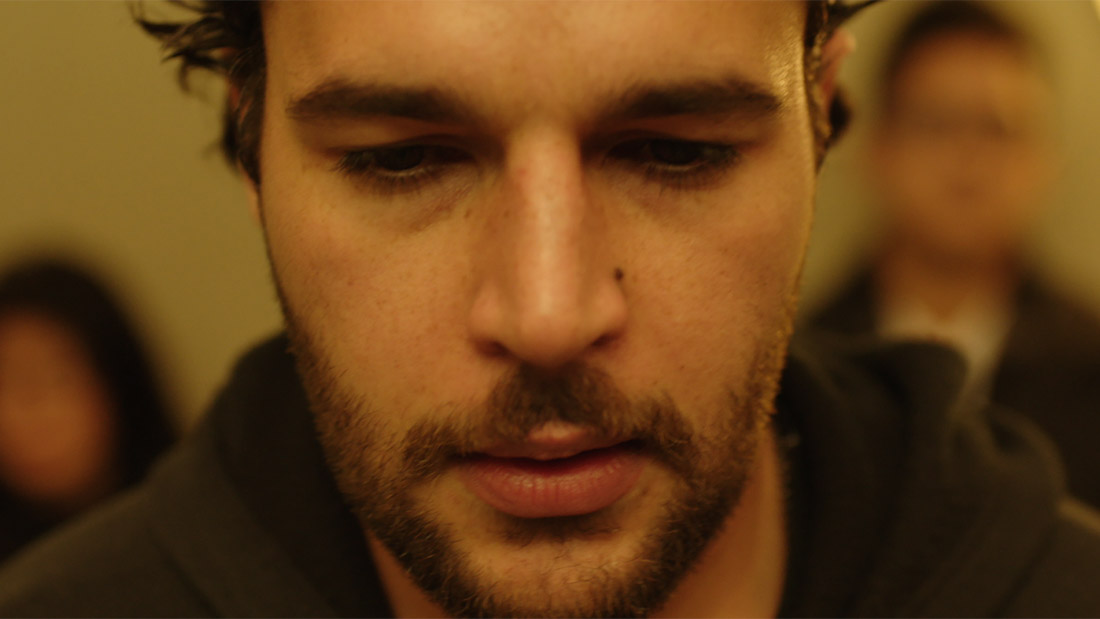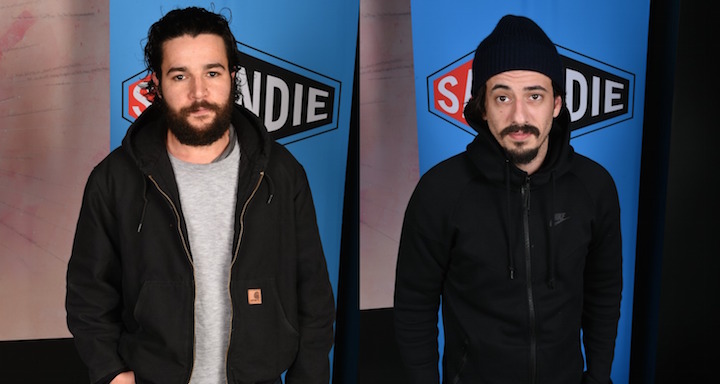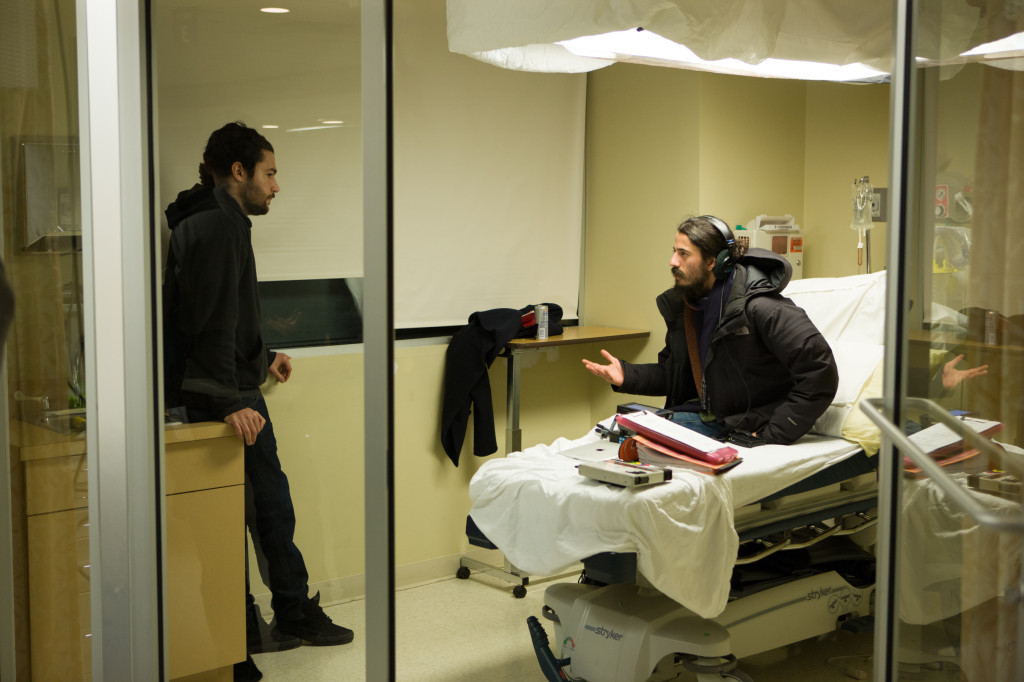For the past few years, filmmaker JOSH MOND and actor CHRISTOPHER ABBOTT have each been a familiar face in the indie film world. Mond’s New York-based production company Borderline Films (formed with fellow Tisch Film School alums Antonio Campos and Sean Durkin) has specialized in provocative, character-driven projects that have struck a chord on the film festival circuits. They came out of the gate strong with 2008’s Afterschool (directed by Campos), which premiered at Cannes. They followed that up with the 2011 Durkin-directed, Sundance Prize-winning Martha Marcy May Marlene, and 2012’s dark Sundance pick Simon Killer (also directed by Campos).
For the company’s fourth feature, Mond took on screenwriting and directing duties with JAMES WHITE, a semi-autobiographical story of a young man’s grieving process in the wake of his father’s death and his mother’s cancer diagnosis. Abbott stars as James, a lead role for an actor who has previously garnered attention with supporting turns in critically-acclaimed films such as Martha Marcy May Marlene, Hello I Must Be Going, and A Most Violent Year, as well as on the HBO series Girls. James White co-stars Cynthia Nixon as the title character’s ailing mother.
James White premiered at Sundance earlier this year (where it won the NEXT Audience Award), and both Abbott and Mond recently nabbed Gotham Award nominations for the film (Abbott for Best Actor and Mond for Breakthrough Director). The Film Arcade will distribute James White in theaters starting November 13.
While in town for the film’s Los Angeles premiere at AFI Fest (where it won an Audience Award), both gentlemen were kind enough to sit down with us and talk about James White.
——
COLIN McCORMACK: Josh, you’ve produced a number of films but this is your first time as a director. What made you decide this was the right time and this was the right story to write and direct yourself?
JOSH MOND: I was fortunate enough to learn and watch my partners [direct], and the intention was always to be a director from the beginning. I directed a lot of short-form, music video, [and] commercial stuff and was experimenting conceptually. But it was through the guidance of my partners during a very tumultuous time in my life when my mother was sick with cancer, that I was encouraged by them in multiple ways to explore something that I needed to understand. Something difficult. And so that just fell into place in that sense. I mean, it didn’t just “fall into place,” it was very hard [laughs], but it seemed like the right thing to do… My parents were both writers, they didn’t do it as a profession [but] they did that their whole lives; what they were writing about was exploring stuff that they didn’t understand personally.
CM: Was the script written with Christopher in mind? Chris, you were reading it pretty early on, right?
CHRISTOPHER ABBOTT: I guess not initially, but Josh can speak for me. I came in fairly early on into the process.
CM: Was that a first for you? Had you ever been on a project where you had that much exposure to the script during different iterations?
CA: Yeah, I would say so. I’ve done other movies with friends, but this was definitely the most heavily involved in that way. Even just going on scouts and stuff beforehand. And after too, being there for some of the edit. It’s the most involved [I’ve been] in a project in that way.
CM: Has that gotten your wheels turning in terms of taking on producing?
CA: No, no. I can’t say [it has] now, because I’m still working on acting. I feel it’s important to do that first. I feel like a lot of [actors] quickly start jumping into directing and stuff and it’s like, You haven’t really figured out [acting]- figure that out first. So maybe down the road, but not now.
CM: Josh, in terms of your [company’s] creative production model – alternating directing duties – when it comes to casting, is whoever’s directing overseeing that, or is it more of a collaborative process with your producing partners as well?
JM: The rule of thumb has always been the boss is the director. We encourage and welcome each other’s opinions, for sure. I definitely talked to them about every decision, debated with them on ideas, but they support whatever the [director’s] final decision is.
CM: In terms of casting, how did Cynthia Nixon come onto the project?
JM: Cynthia read the script and we met for breakfast, and we just got to know each other and suss each other out, and through that she shared with me her experience losing her mom a couple months previously to cancer. And I got to know her. She was from the Upper West Side, and she was close with her mom, and she’s a strong woman and very liberal and I just thought she seemed like she would have been friends with my mom and my mom would have been friends with her mom, and it just seemed like she understood that world. And we got to know each other enough to go down this road together.
CM: Did the schedule and budget allow for rehearsal?
CA: No.
CM: How did you and Cynthia get to know each other? Did you have time to try and form a bond?
CA: Not too in-depthly. I met a few times with her and Josh just for breakfast or coffees a couple times before shooting. I mean, she’s such a professional in that way and she’s so talented– it’s not like you need to manipulate anything at all. She does her work and she shows up and you trust her. Kudos to her and kudos to Josh for casting her and everyone in the film, because I think given the time constraint we had, it was extremely beneficial to have people who were that good and that professional in that way.
CM: It seems like it’s a pattern in [Borderline’s] films that there’s always a huge amount of great actors. Do you always have your eye on people coming up, or do you just work with a good casting director?
JM: We had a very interesting start. Susan Shopmaker is our casting director and I’ve known her since I was like twelve years old. And then we reconnected when I was about nineteen, and we begged her to do Afterschool, and she thought we were cute and funny and charming, and she was like, “Okay, yeah sure…” and we kind of stalked her for a while. But we basically ended up working for her for five years. She gave us an address for our company, and one desk for our work, but we really ran castings, did camera, read actors, and that really allowed us to understand the scene in New York and– she really has some of the best taste in actors, and we got to understand that world. I think we also learned who the best actors were for things and we were exposed really early on to theater actors like Paul Sparks, Gary Wilmes, Rosemarie DeWitt, Michael Stuhlbarg, Lee Wilkof–
[Music from Disney’s The Little Mermaid inexplicably starts blaring from the speakers in the room we’re in. We all laugh and Josh powers through.]
JM: And besides being exposed to that, by supporting each other we really got to figure out who was best for the roles.
CM: And did you two guys meet through an actor friend?
CA: No, [we met] about a year before Martha on a film that they worked on, [I met them] through Susan and the casting on that. And then a year later Sean and them asked me to do the reading of Martha and then I became friends with them through that.
CM: Chris, you’ve worked primarily on independent films as well as theater and TV. Has there been now some external pressure to start reaching for the superhero roles and the tentpole type movies?
CA: Maybe for exploratory reasons. I’m not being humble, but I really don’t think– I don’t know if I can do superhero stuff, I don’t know if I have the right energy for that-
JM: I think you’d fucking be amazing.
CA: Maybe some weird superhero, I don’t know.
JM: I think it’s in his future.
CA: And not just as a stepping stone like, Now it’s time to do big movies. I did my first studio movie last year. But I’m just so interested in the scope of them, and what it’s like to work on those budgets and having that amount of resources. Just production-wise I want to experience that. I want to see helicopters flying over, you know what I mean? I just think that stuff is so cool. So yeah, I do have my eye on that in a way.
CM: And I had read somewhere that Law & Order was somehow an inspiration for your films, Josh?
JM: Yeah, I’m not even going to smile about that, I’m going to be confident about that.
CM: I love Lennie Briscoe as much as anyone else, but how do those come together?
JM: I think the first three seasons of Law & Order is probably the best– the most artful, the most raw, and it reflects New York in the best way possible. I think it’s the most authentic to New York and it’s just so gritty. It’s [Sidney] Lumet, even though Lumet didn’t do it. And there’s just a pacing to it for me, and there’s also a nostalgia to it. It was on all the time, I used to watch it with my mom constantly. The perfect Sunday was a marathon.
CM: You can drop in and out whenever-
JM: And you’re with these characters for twenty years, so you get to grow with these characters and you get to go back and forth- it’s like Antoine Doinel in a weird way [laughs]. It’s like Sidney Lumet’s Antoine Doinel. You’re in their lives and there’s a weird narrative for a whole day of watching. It’s like its own kind of experience. But the pacing of it was a huge influence on me, and the way that they handled New York. I don’t know, I see Panic in Needle Park in it, I see Midnight Cowboy in it, I love it.
CM: Chris, have you ever done a Law & Order?
CA: Yeah.
CM: That’s always on an actor’s resume, right?
CA: It’s a rite of passage for New York actors.
CM: Were you a suspect?
CA: I was the guy you think was the murderer; the easy peg at first, but wound up not being it.
JM: My understanding is that they’re bringing it back. The original, that’s what I’ve heard.
CM: It was on for like twenty years, but I still felt like it was gone too soon.
JM: Have you seen the first three seasons?
CM: Those were the seasons with- was it Paul Dzundza? Something Dzundza.
JM: Yeah, and [Michael] Moriarty.
[Editors Note: It’s George Dzundza. Sorry, George.]

CM: In terms of [the James White] marketing, I wanted to talk about the poster, which I loved so much.
JM: Thanks.
CM: Did you have a hand in picking that? Who was the artist?
JM: The artist Brandon [Schaefer] is the same guy who did the Simon Killer poster. We were looking for something that wasn’t just capturing a moment from the film, or a feeling. It was something that was an extension. And he just sent it over and it was the first thing that I saw where it was striking, and I didn’t fully understand it yet, but I knew if I would see it [on the street] it would stop me [to] look at it. And then seeing the movie I’d get a continued narrative. And it felt like an artist did it.
CA: It’s a very nostalgic poster. It’s got a retro kind of feel to it too, which I like. Without being too on-the-nose.
JM: I think he’s extremely elegant. I think he’s fantastic. And being able to have a continued relationship with him from Simon to this is awesome. I think he’s a real artist.
CM: Was this your first time working with The Film Arcade?
JM: Absolutely.
CM: A lot of directors I’ve talked to don’t necessarily have anything to do with negotiating distribution. But since you have producer experience, were you more involved?
JM: Absolutely. [The Film Arcade] are extremely filmmaker-friendly. They have been doing everything that they said they were going to do. They were very humble in how they approached us, saying they really loved the film and everybody that worked on the film should love the film, it shouldn’t just be a job. And we got to be involved in the hiring of the marketing, and the hiring of the publicists, and the booker, and poster design, and trailer. So it was very collaborative. It was a continuation of making the film. And they’re releasing it before the New Year, which is very hard to get done. They’re committing to a traditional theatrical [release]. It’s been a really great experience thus far. And I hope it continues. Now they’re producing movies as well, with filmmakers I admire. I think they’re doing it right.
CM: Are Antonio or Sean up next with a directorial effort?
JM: Yeah, Sean and I executive-produced [Antonio’s] new movie Christine with Rebecca Hall, Michael C. Hall, Tracy Letts, Maria Dizzia, and it’s a brilliant film. And it’s pretty much almost done. And we just supported two other filmmakers-
[As he talks, dramatic orchestral music starts blasting again through the room’s speakers.]
JM: This is a great soundtrack.
CM: It makes it sound like you’re giving a very epic answer.
CA: [serious trailer voice] Three filmmakers. One movie.
JM: Starring Christopher Abbott as a superhero filmmaker.
CA: Get down! Run! Noooo!
JM: Cut! [Laughs]
CM: So this is the tail-end of your guys’ festival tour as well. How’s that been?
JM: It’s been great. Chris and I have been doing mostly the domestic stuff together. Some of the festivals that we did internationally, he was doing a play or they could only take me. It’s been a long journey and it’s been pretty amazing. It’s a good place to end up, because AFI has played all of our movies. So it’s kind of fitting and the perfect place to launch.
CA: To come full circle in that way.
JM: It’s a little strange how fitting it is.
[Choral music starts playing.]
JM: Ah, here are the credits.

LIGHTNING ROUND!
What’s the first movie you guys remember seeing in theaters?
Josh: I mean, this song is influencing my memory.
The Little Mermaid?
Josh: That actually was a big movie in my family. An American Tail. Feivel!
Christopher: God, was it Batman? I don’t even know, that’s a good question.
What’s your go-to drink order at the bar?
Josh: [Laughs] Depends on the day.
Christopher: I like wine, but if I was at a bar-bar, tequila. Just tequila on the rocks with a lime. Corzo Tequila.
Josh: Right now it’s a latte, since it’s three o’clock.
Recommend a movie you love that maybe most people haven’t heard of.
Josh: I plug the same movie over and over again. [To Christopher] You go first.
Christopher: It’s hard. Some of the things I want to say, I don’t want to denounce it by saying people haven’t seen it, know what I mean?
Something that deserves a bigger spotlight on it, maybe?
Christopher: I’ll say the last Béla Tarr film, The Turin Horse.
Josh: Any Joachim Trier movie… Reprise. Oslo, August 31st. And his new movie Louder Than Bombs. I usually have the same movies I suggest. I say Joachim’s movies and Denis Villeneuve’s movies. What was the high school shooting one? [Note: Polytechnique] It was just epic. And Incendies for sure. Any James Gray movie. True Romance.
Christopher: Bertrand Bonello’s film L’Apollonide.
Josh: Yeah, Saint Laurent I thought was actually pretty amazing.
Christopher: Yeah that was great, but the one before that one, L’Apollonide – the English title was House of Treasure or something I think. [Note: The English title is House of Tolerance.]
What’s an interview question you never want to hear again?
Josh: How Chris and I met- no [laughs].
Tell us what the movie’s about?
Josh: Yeah, I hate that. ‘Cause I still don’t know how to do that. And it’s not just journalists, it’s people.
Christopher: How many days did you shoot? That’s an easy answer.
Was it fun working with so-and-so?
Christopher: Yeah.
Like you’re going to say, No it was terrible.
Christopher: [Laughs] Yeah, I know. Exactly.
Finally, where and when can people see James White? What is the theatrical rollout?
Josh: It comes out in New York at the Sunshine on November 13. And then November 20 at the Arclight in Los Angeles. And then the following week it starts to roll out around the country in selected cities.
Christopher: Week by week. December 4 San Francisco. Chicago’s before that I think.
Josh: November 27 [in Chicago]. And then San Diego, DC, Colorado-
[“Part of Your World” from The Little Mermaid starts blasting, drowning us out and providing a heartwarming and melodic end to the interview.]
__
Thanks to Josh and Christopher for talking to us about JAMES WHITE. Follow the film on Facebook.
If you’re an independent filmmaker or know of an independent film-related topic we should write about, email blogadmin@sagindie.org for consideration.



